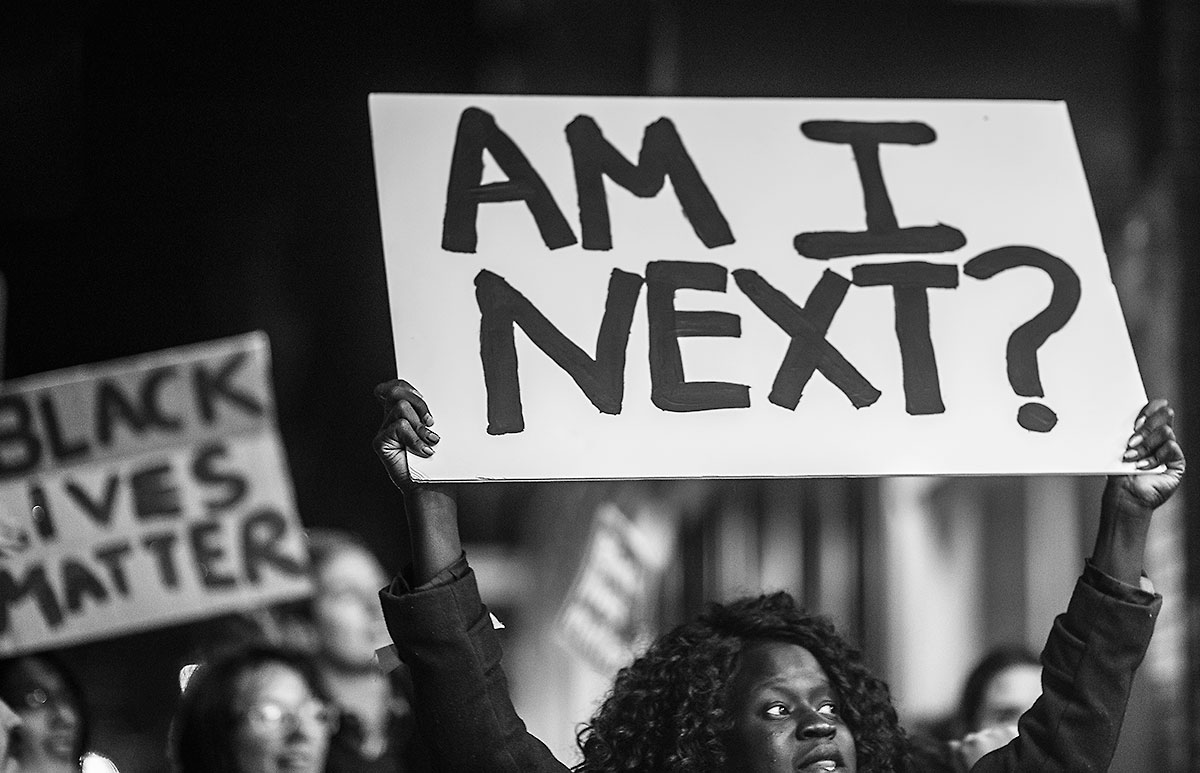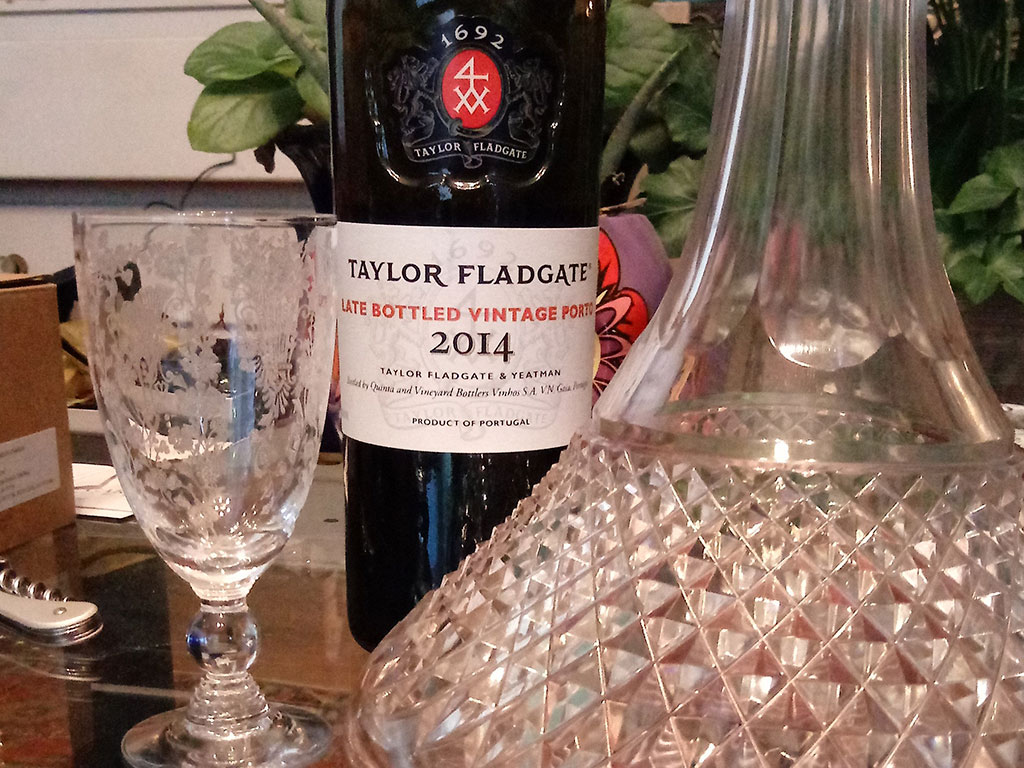
By Adam Marletta
Are you one of the many Portlanders who were annoyed by the recent Black Lives Matter demonstration that brought traffic on Middle Street to a halt? Did it prevent you from rushing home to your Friday night Game of Thrones binge-watching marathon? Did it deter tourists from patronizing your swanky Old Port restaurant (one of about a dozen “small businesses” that you own)? Were you sufficiently inconvenienced by the whole affair?
Good. That was the point.
“Protest beyond the law,” Howard Zinn famously wrote, “is not a departure from democracy; it is absolutely essential to it.”
Black citizens are tired of being ignored by White America. They are incensed at the seemingly routine police violence inflicted on black and brown people—most of them unarmed. What you heard at the much discussed and debated July 15 protest, led by the radical group, Portland Racial Justice Congress, was the voice of the voiceless. These black (and white) protesters — most of them young people — were desperately but defiantly attempting to assert their humanity to a society that is largely indifferent to their plight.
A riot, Dr. Martin Luther King, Jr. observed in a March 14, 1968 speech, is the “language of the unheard.” While the largely peaceful PRJC protest can hardly be described as a “riot,” Dr. King’s words from this often overlooked talk nonetheless remain relevant.
“And what is it that America has failed to hear?” he asked.
It has failed to hear that the plight of the negro poor has worsened over the last few years. It has failed to hear that the promises of freedom and justice have not been met. It has failed to hear that large segments of white society are more concerned about tranquility and the status quo than about justice and humanity.
King spoke these words nearly 50 years ago. Yet, for all our claims to having “transcended” race, or that we now inhabit a “post-racial” society, they could have just as easily been written today. To wit, numerous local columnists — many of them liberal — denounced the July 15 demonstration as “pointless,” or “counterproductive,” and its aims as “unclear” or even “misguided.”
Francis Flisiuk of the Portland Daily Sun — err, I mean, Portland Phoenix (Portland Daily Phoenix…?) — in his most recent column chastises the protesters not only for blocking traffic, but for allegedly further antagonizing certain drivers (specifically, the driver of the Jeep that tried to run protesters over at one point), in the process.
“Protesting police brutality and systemic racism is one thing,” Flisiuk writes, “but blocking traffic is simply fruitless, especially with just a handful of participants. I don’t care about inconveniencing people, [sic] I care about the effectiveness of the action.”
(The last sentence is a run-on. Also, the word is “protester,”–not “protestor.” Flisiuk alternates between both spellings throughout his un-proofread article.)
Bangor Daily News columnist, Chris Busby echoes Flisiuk’s sentiments. “[T]he cause of Black Lives Matter is not served by antagonizing or alienating cops who share the movement’s values,” he writes in recent piece titled, “When it’s Time to Protest–And When it Isn’t.” “Doing so is strategically counterproductive and downright damaging to the effort to get the public on your side.”
But, if PPD officers do, in fact, “share the movement’s values,” as Busby suggests, why could police Chief Michael Sauschuck not be bothered to at least meet with the protesters and hear their grievances? It seems like a simple act, if you ask me.
Likewise, why did a group of officers deliberately turn their backs on a black BLM activist when she casually approached them just to talk? Indeed, the action is reminiscent of New York Police Department officers who turned their backs on Mayor Bill de Blasio in 2015 during the funeral for slain officers Wenjian Liu and Rafael Ramos, in a coordinated show of defiance against his “anti-cop” rhetoric. (Blasio’s rhetoric merely consisted of parentally instructing his black teenage son not to talk with the local police.)
In stereotypical liberal fashion, Flisiuk and Busby express support for Black Lives Matter’s cause, but not the activists’ methods. This is the standard liberal rhetoric immediately following a police murder of a black person. Groups like Black Lives Matter are told to “tone down” their “divisive” calls for police accountability. We are told we must all “come together.” President Barack Obama lectures BLM activists to keep a “respectful tone.”
As the editors of the Socialist Worker observed shortly after the murder of five police officers in Dallas:
… After Dallas, all the pressure that the media and political establishment can mount is directed against those who want to stand up against the epidemic of police violence–to not be “too radical” or “too angry” or demand “too much too soon.”
But this liberal rhetoric should be seen for what it truly is: A cynical ploy to effectively silence groups like Black Lives Matter. It is an attempt to cut the movement off before it grows bigger. While bigoted conservatives take to the Internet to denounce BLM as “racist” or “terrorists,” liberals police their own (so to speak) through cloying calls for “moderation,” “tolerance,” and maintaining a “respectful tone.”
Flisiuk and the Portland Press Herald’s Greg Kesich both take issue with the notion that the PPD is “racist.”
“Serious question: Is the Portland Police Department truly racist?” Flisiuk asks. “I’d really like to know, because I’d be the first to write a scathing article, ousting a hot-headed racist cop. But I’m yet to find one.”
Kesich, likewise offers this simplistic advice for dealing with alleged racist cops in Portland: “Just identify the bad cops and get them off the street,” he writes in a July 20 op-ed column. Rather than pointing at individual police officers, Kesich argues, it is up to “leaders in business, politics, education, religion and the media” to “show the kind of leadership that Sauschuck is showing.”
The actual extent of Sauschuck’s “leadership” on speaking out on racist police violence aside, these pundits’ shallow analysis completely misses the broader issue of institutionalized police racism. The epidemic of police shootings of unarmed black people is not, as liberals often claim, merely the result of a “few bad apples.” The entire system of law enforcement — with its origins in the 19th century Southern slave patrols — is rotten to the core.
Forget everything you learned in grade-school about police apprehending criminals and keeping communities safe. The police exist to protect bourgeois property and wealth, crackdown on unions (even though police officers themselves enjoy one of the strongest unions in the country), and thwart working-class uprisings — violently if need be. The police, in other words, are capitalism’s foot-soldiers. Far from being the protectors of an open, democratic society, they are more often than not an impediment to it.
“[V]iolence is an inherent part of policing,” Kristian Williams writes in his recently updated book, Our Enemies in Blue: Police and Power in America. “The police represent the most direct means by which the state imposes its will on the citizenry. When persuasion, indoctrination, moral pressure, and incentive measures all fail–there are the police. In the field of social control, police are specialists in violence. They are armed, trained, and authorized to use force. With varying degrees of subtlety, this colors their every action. Like the possibility of arrest, the threat of violence is implicit in every police encounter.”
But rather than dig into these weighty, substantive questions of the role of the police which might actually inform readers, the local press would rather praise Sauschuck’s “bold leadership,” and the PPD’s “professionalism” in “handing the situation.”
Again, it is worth reiterating that Flisiuk, Busby, and the pro-economic growth Kesich all occupy the center-left spectrum of liberal opinion. I am all for comradely dialogue with the power elite if it seems such an approach could actually be worthwhile. But ask yourself: When throughout U.S. history have working class people — including women, blacks, immigrants, gays — brought about substantive democratic gains by calmly pleading with the bourgeois power structure?
As Eugene Debs famously said, “Intelligent discontent is the mainspring of civilization. Progress is born of agitation. It is agitation or stagnation.”






Peaceful Protests and the Liberals Who Denounce Them
By Adam Marletta
Are you one of the many Portlanders who were annoyed by the recent Black Lives Matter demonstration that brought traffic on Middle Street to a halt? Did it prevent you from rushing home to your Friday night Game of Thrones binge-watching marathon? Did it deter tourists from patronizing your swanky Old Port restaurant (one of about a dozen “small businesses” that you own)? Were you sufficiently inconvenienced by the whole affair?
Good. That was the point.
“Protest beyond the law,” Howard Zinn famously wrote, “is not a departure from democracy; it is absolutely essential to it.”
Black citizens are tired of being ignored by White America. They are incensed at the seemingly routine police violence inflicted on black and brown people—most of them unarmed. What you heard at the much discussed and debated July 15 protest, led by the radical group, Portland Racial Justice Congress, was the voice of the voiceless. These black (and white) protesters — most of them young people — were desperately but defiantly attempting to assert their humanity to a society that is largely indifferent to their plight.
A riot, Dr. Martin Luther King, Jr. observed in a March 14, 1968 speech, is the “language of the unheard.” While the largely peaceful PRJC protest can hardly be described as a “riot,” Dr. King’s words from this often overlooked talk nonetheless remain relevant.
“And what is it that America has failed to hear?” he asked.
King spoke these words nearly 50 years ago. Yet, for all our claims to having “transcended” race, or that we now inhabit a “post-racial” society, they could have just as easily been written today. To wit, numerous local columnists — many of them liberal — denounced the July 15 demonstration as “pointless,” or “counterproductive,” and its aims as “unclear” or even “misguided.”
Francis Flisiuk of the Portland Daily Sun — err, I mean, Portland Phoenix (Portland Daily Phoenix…?) — in his most recent column chastises the protesters not only for blocking traffic, but for allegedly further antagonizing certain drivers (specifically, the driver of the Jeep that tried to run protesters over at one point), in the process.
“Protesting police brutality and systemic racism is one thing,” Flisiuk writes, “but blocking traffic is simply fruitless, especially with just a handful of participants. I don’t care about inconveniencing people, [sic] I care about the effectiveness of the action.”
(The last sentence is a run-on. Also, the word is “protester,”–not “protestor.” Flisiuk alternates between both spellings throughout his un-proofread article.)
Bangor Daily News columnist, Chris Busby echoes Flisiuk’s sentiments. “[T]he cause of Black Lives Matter is not served by antagonizing or alienating cops who share the movement’s values,” he writes in recent piece titled, “When it’s Time to Protest–And When it Isn’t.” “Doing so is strategically counterproductive and downright damaging to the effort to get the public on your side.”
But, if PPD officers do, in fact, “share the movement’s values,” as Busby suggests, why could police Chief Michael Sauschuck not be bothered to at least meet with the protesters and hear their grievances? It seems like a simple act, if you ask me.
Likewise, why did a group of officers deliberately turn their backs on a black BLM activist when she casually approached them just to talk? Indeed, the action is reminiscent of New York Police Department officers who turned their backs on Mayor Bill de Blasio in 2015 during the funeral for slain officers Wenjian Liu and Rafael Ramos, in a coordinated show of defiance against his “anti-cop” rhetoric. (Blasio’s rhetoric merely consisted of parentally instructing his black teenage son not to talk with the local police.)
In stereotypical liberal fashion, Flisiuk and Busby express support for Black Lives Matter’s cause, but not the activists’ methods. This is the standard liberal rhetoric immediately following a police murder of a black person. Groups like Black Lives Matter are told to “tone down” their “divisive” calls for police accountability. We are told we must all “come together.” President Barack Obama lectures BLM activists to keep a “respectful tone.”
As the editors of the Socialist Worker observed shortly after the murder of five police officers in Dallas:
But this liberal rhetoric should be seen for what it truly is: A cynical ploy to effectively silence groups like Black Lives Matter. It is an attempt to cut the movement off before it grows bigger. While bigoted conservatives take to the Internet to denounce BLM as “racist” or “terrorists,” liberals police their own (so to speak) through cloying calls for “moderation,” “tolerance,” and maintaining a “respectful tone.”
Flisiuk and the Portland Press Herald’s Greg Kesich both take issue with the notion that the PPD is “racist.”
“Serious question: Is the Portland Police Department truly racist?” Flisiuk asks. “I’d really like to know, because I’d be the first to write a scathing article, ousting a hot-headed racist cop. But I’m yet to find one.”
Kesich, likewise offers this simplistic advice for dealing with alleged racist cops in Portland: “Just identify the bad cops and get them off the street,” he writes in a July 20 op-ed column. Rather than pointing at individual police officers, Kesich argues, it is up to “leaders in business, politics, education, religion and the media” to “show the kind of leadership that Sauschuck is showing.”
The actual extent of Sauschuck’s “leadership” on speaking out on racist police violence aside, these pundits’ shallow analysis completely misses the broader issue of institutionalized police racism. The epidemic of police shootings of unarmed black people is not, as liberals often claim, merely the result of a “few bad apples.” The entire system of law enforcement — with its origins in the 19th century Southern slave patrols — is rotten to the core.
Forget everything you learned in grade-school about police apprehending criminals and keeping communities safe. The police exist to protect bourgeois property and wealth, crackdown on unions (even though police officers themselves enjoy one of the strongest unions in the country), and thwart working-class uprisings — violently if need be. The police, in other words, are capitalism’s foot-soldiers. Far from being the protectors of an open, democratic society, they are more often than not an impediment to it.
“[V]iolence is an inherent part of policing,” Kristian Williams writes in his recently updated book, Our Enemies in Blue: Police and Power in America. “The police represent the most direct means by which the state imposes its will on the citizenry. When persuasion, indoctrination, moral pressure, and incentive measures all fail–there are the police. In the field of social control, police are specialists in violence. They are armed, trained, and authorized to use force. With varying degrees of subtlety, this colors their every action. Like the possibility of arrest, the threat of violence is implicit in every police encounter.”
But rather than dig into these weighty, substantive questions of the role of the police which might actually inform readers, the local press would rather praise Sauschuck’s “bold leadership,” and the PPD’s “professionalism” in “handing the situation.”
Again, it is worth reiterating that Flisiuk, Busby, and the pro-economic growth Kesich all occupy the center-left spectrum of liberal opinion. I am all for comradely dialogue with the power elite if it seems such an approach could actually be worthwhile. But ask yourself: When throughout U.S. history have working class people — including women, blacks, immigrants, gays — brought about substantive democratic gains by calmly pleading with the bourgeois power structure?
As Eugene Debs famously said, “Intelligent discontent is the mainspring of civilization. Progress is born of agitation. It is agitation or stagnation.”